- Home
- Rick Mofina
Cold Fear Page 3
Cold Fear Read online
Page 3
Together, they estimated the time Paige vanished, the area or possible direction.
This is not real.
Emily was numb to reality. It was not happening. She was not standing here with strangers on a ledge in the Rocky Mountains talking about the disappearance of Paige. Her only baby. Gone. Swallowed.
Her monster was out there.
The other ranger tested his radio saying how elevation, proximity of other radios, and weather made communication here erratic. Mac scanned the forests with huge binoculars.
“There’s an old mining trail through the valleys and basins that was abandoned in the 1800s,” he said. “We’ve got some searchers on horseback coming from the Blackfeet Reservation. They know this area well.”
A cool wind rushed over them bringing a thump-thump-thump. The helicopter had returned with three more park rangers and more gear. Then departed. More grim-faced people said their names, changing into jumpsuits, setting up big tents, tables, a canopy, generators, lanterns, stoves. A practiced ritual.
A different helicopter arrived. More people. Two official-looking men in that group. The first, well-built, about six foot two, solid. Silver hair. Looked to be in his fifties. Leathery tanned skin. Poker-faced.
“Pike Thornton,” he introduced himself, his voice deep and strong. “Law enforcement officer with National Park Service.” Soft blue eyes, just like Emily’s dad. “Folks, we’ve alerted the FBI. They’re on their way--”
“FBI?” Doug said.
“We both have jurisdiction over a national park, but this is an official missing person’s case involving a child. We take it very seriously. So we alerted them. They’ll be helping.”
Doug understood.
“Brady Brook.” The second man, slightly younger and wearing blue overalls, introduced himself as the district ranger who was the Incident Commander. “I’ll be in charge of the SAR operation here in the field to find Paige.” He removed his hat, revealing short-cropped brown hair. Neat and clean-shaven, he wore frameless glasses and the serious air of a soft-spoken, capable man. “I’ve been with the park for six years. In that time, we’ve done about forty major searches for lost people. Located them in every case.”
“And in how many cases were they alive?” Doug asked.
Thornton and Brook exchanged glances.
“Most every one,” Brook said.
“Except accidents,” Thornton said. “Falls and such.”
Emily hands went to her mouth. Doug put his arm around her.
“Each case has its own circumstances,” Brook looked Emily and Doug in the eye. “Locating Paige is the park’s priority. It’s been over twenty-four hours. We’ll need very specific information fast. Let’s get started, please.”
Brook took them to the table where a woman was typing on a laptop computer. Helicopters continued arriving with more people as Brook and the woman took information from Doug and Emily. Shouting over the noise, they entered Paige’s vital statistics, her medical, physical, mental condition.
“Did she have any items with her?”
“She had Kobee, her dog, a beagle,” Emily said.
The woman’s eyes went to Brook, who looked at Mac.
Brook pursed his lips refraining from telling the Bakers that a dog can attract bears, enrage them, lead them right to the owner. Emily and Doug had known the risk but ignored it. Brook caught their self-reproach.
“The dog can be an asset,” he said. “It can keep her warm, force her to think of it, keep her spirits up. Be a psychological blanket.”
“Really?” Emily sniffed.
“It’s been the case in other wilderness searches for children,” Brook said.
They inventoried Paige’s tent. Thornton looked around on his own. It was deduced that Paige had a sweatshirt, T-shirts, hat, water or juice boxes, fruit, granola bars, candy and a penknife.
The searchers asked if Paige had any wilderness, or survival experience. What was the family situation before she got lost? Doug and Emily exchanged glances.
“She was not having fun, Doug said. “This was, is, her first time backpacking. She misses the city and the comforts of home.”
Thornton ventured a theory. “Any chance she was angry and went off in a preteen tantrum?”
Doug looked at the ground. Emily looked at the horizon; the sun was nearing it. Another helicopter was approaching, its increasing thump pressing for an answer. “Yes,” Doug said, “there’s a chance of that.”
Using Paige’s vital stats--four-feet-seven inches tall, seventy pounds--they estimated her step, measured it against the terrain and time, to determine a search perimeter, sectors, boundaries; then they dispatched teams, equipped with radios, water, food, warm clothing and gear.
“They will search in shifts until dark, when it becomes too dangerous. They’ll camp, resume searching at daybreak,” Brook said. “More volunteers, dog teams, fixed-wing aircraft, all are on the way. We’ll search until we find her, using every resource we can.”
Emily thanked Brook. Doug took him off to talk alone with him.
“You’ve done your calculations.” Doug’s voice wavered. “Tell me now. How much time before it’s critical, given what you know?”
“Doug, each case is--”
“Don’t bullshit me now. I am her father. I am an ex-marine, I know about ratios of survivability. Now give it to me.”
Brook looked at him. Man to man. Father to father.
“Three to five days.”
Three to five days. His little girl could be dead in three to five days and they had already lost twenty-four hours.
“Doug, we’ve got lots of experienced people helping. Lots of hope.” Brook put his hand on his shoulder then excused himself.
Doug watched a helicopter conducting aerial searches. In minutes, the group of some forty people, which had gathered within an hour on the ridge, had virtually vanished into the forests. Brook requested Emily and Doug stay put with the base team at Incident Command.
Incident Command--that is what their family campsite had become. Their trip was a federal incident involving the FBI.
Doug was overwhelmed, exhausted. He wanted to go off to sit alone when Thornton approached him and Emily, producing a small notebook.
“Folks, I hate to trouble you. I’ve got to take down a few more particulars for the first report. I am sorry.” Thornton recorded addresses and office numbers; then he asked for a picture of Paige.
“A picture?” Emily said.
“Yes, a recent one, to put out everywhere--at the park gates, police agencies. The press.”
“We took some on this trip, but I--I don’t understand, she’s out there--”
“Well, ma’am we have to be prepared for all scenarios.” Thornton let that sit. Doug got it. So did Emily when Thornton asked his next question.
“Did you happen to see many strangers, or anything odd out here or on the way?”
They had not.
“Well, I am sorry. We won’t get into this now but the FBI might.” Thornton grew concerned. “You want to get that hand looked at, Doug?”
Doug glanced at the bloodied gash on his left palm. “Looks worse than it is actually.”
“Really? Looks bad. What happened?”
“Hurt it chopping wood. It’s just a small cut.”
Thornton’s eyes went from the wound to Doug, measuring him for a few seconds. “With an ax?” he said.
Doug nodded.
“Well, you might want to get it taken care of.”
“It’s fine.”
Thornton left it, then reminded Emily of the need for a picture.
“I’ll get my camera,” Emily sniffed. “It’s digital, is that OK?”
“Even better. Brook’s people can transmit it to headquarters. We’ll have it out far and wide in no time.”
Emily went for her camera, leaving Doug with Thornton, who from the moment he had set foot on the ridge had studied Doug and Emily. Listening. Watching. Absorbing everything thro
ugh soft blue eyes that seldom missed a thing.
Like that nasty wound on Doug’s left hand.
Doug would be asked about that when the FBI got its people here. Thornton had been updating them on the radio-phone link to their field office in Billings, which in turn alerted the FBI’s division office in Salt Lake City.
In keeping with procedure, Thornton had been assuming criminal intent from the instant he received Mac’s report and the notation about Doug Baker’s hand.
Checks through the National Crime Information Center, the FBI-operated crime computer, showed Doug served three days in Cook County Jail several years ago for a dustup in a Chicago bar. Beat up two guys pretty bad. Suggested a violent history.
Doug’s recent history was more serious. The San Francisco Police Department’s local computers showed that a few days before the Bakers left for Montana, a neighbor called 911 to report a violent domestic argument at the Baker home. The caller complained of Doug shouting, threatening to assault Emily.
A unit responded. No injuries. No charges. Emily said it was just a misunderstanding. A loud discussion.
Then there was the recent edict from the National Park Service Washington Office after the Yellowstone case. Just over a month ago, a father hiked out of a remote trail to report that his five-year-old daughter was lost. A search was launched. Turned out in the confusion no one checked out the dad. He had a laceration on his neck and a criminal history of abusing his ex-wife over custody of the child. A week later, when the girl’s body was found, an autopsy determined she had been stabbed to death. By this time, the father had vanished and was thought to be in South America. That led Washington to demand immediate assumption of criminal intent in major missing persons reports in national parks with a multi-agency response. This one fell into that category, and the FBI and SFPD were already on it.
Being an old mountain cop, Thornton had a few concerns. Like how Doug hurt that hand. Said he did it chopping wood. Funny, Thornton had already poked around some. No sign of an ax. Something was going on here. Something Doug and Emily had not told them.
Well, not yet anyway, he thought, tucking his notebook in his pocket.
FIVE
Walt Sydowski’s eighty-eight-year-old father, John, played his last card, the queen of diamonds.
“Victory.”
“You are a crafty old fox,” Sydowski said in Polish, losing a round of crazy eights, their favorite game.
“Not too old to teach you a trick or two, eh?” John’s eyes twinkled, as he claimed his five bucks, folding it triumphantly.
“That’s right, Pop.” Sydowski patted his old man’s wrinkled hands. “I’ve got to check on the birds, Dad. Want to help me?”
“Sure, let’s go.”
Sydowski was enjoying having his father stay with him during these few days he was off. Sydowski lived alone in Parkside in the house where he and his wife, Basha, had raised two daughters. It got a little lonely. His old man, a retired barber, still preferred to live at Sea Breeze Villas, a seniors’ complex in Pacifica. He had his friends, his vegetable garden, and followed baseball. Sydowski liked his visits. Before their game they had homemade cream of potato soup, the way Basha used to make it. With real cream.
They went to the aviary Sydowski had built in his backyard under the oak tree, a lifetime ago it seemed. Inside, they were met by the cooing of some five dozen caged song birds. Photographs and ribbons won at bird fairs covered the paneled walls. Sydowski liked coming here to listen to the tiny birds and review cases. Like the doubleheader they cleared a few months ago. That beast almost brought him to his knees.
Sydowski was concerned about his new bred budgerigars. They offered an appealing cinnamon and opaline wing markings but he noticed their droppings seemed off color and lacked consistency. Maybe if he fortified their seed mix with some calcium.
“You know, Dad, I met a nice lady a few months ago at the Seattle show.”
“Louise, from San Jose. You got the budgies from her. You told me.”
“I was thinking of asking her over for dinner.”
“You need a woman? At your age?”
“Watch it.”
Sydowski smiled at last week’s conversation on the phone, Louise asking him for coffee.
“I could come to San Francisco, Walt. Or you could come here?”
“Well, I got some cases to work on,” he said. “Can I get back to you?”
“I’m not going anywhere.”
They’d hit it off in Seattle. Louise was a budgie breeder, also widowed. Her husband, a judge, had died three years ago. Stroke. Her daughter owned a small computer-graphics company in Sacramento. Her son was a medical lawyer in Pittsburgh. Aside from her birds, she taught drama classes and was a working actor. She had done some national commercials and had been an extra in a few movies. Louise was vibrant--sixty-one going on forty-one. Gorgeous and, for some strange reason, smitten with him the moment she came up behind him on the floor of the Seattle show.
“Well where did you come from, Mr. Walt Sydowski?”
He turned to meet mischief and flirtation in the green eyes peering up at him over a coffee mug.
Sydowski had a pleasing, solid six-foot-three, two-hundred-pound build, wavy salt-and-pepper hair touching off his dark complexion and rugged smile, which glinted because of his two gold-crowned teeth. Most people were intrigued by his smile. Unless, of course, they were a suspected killer.
Louise had cast some sort of spell on him that day in Seattle. She had done some investigating, learning from other exhibitors all about Inspector Wladyslaw Sydowski of the San Francisco Homicide Detail.
They talked over lunch, about raising a family, about losing a spouse, about acting, about memories, about birds. He liked her and told her of the anguish of cases involving children.
Being with her was like being with an old friend, and in the weeks after Seattle, when they talked on the phone, Sydowski felt something warm flowing into an area of his life that had been cold and empty for so long. But why was he afraid?
“You think you are cheating on Basha after six years? Or that the girls might not approve? You want my permission to have a date?”
Sydowski stroked a fledgling with his pinky knuckle and shrugged.
“I guess, something like that. I don’t know.”
“Your problem is you maybe want to leave the job, or need something new in your life. Those cases with the baby and the kidnapped kids still shake you pretty good. I see it in your face.”
Sydowski would always be haunted by the case of two-year-old Tanita Marie Donner. Her little corpse hidden in Golden Gate Park. For over a year, he went nuts trying to clear it. Then two other kids were abducted, creating hysteria for the Bay Area, pressure from the brass. The fear that all three files were connected when another child was grabbed--the son of Tom Reed, a reporter for the San Francisco Star, who was covering the story. The kidnapper, a psycho twitcher named Keller, had planned to kill the kids.
“Yes, they were hard cases. You could be on the right track there, Pop.”
After Keller, it took a few weeks for Sydowski to wind down. In all his years with the SFPD, in handling nearly six hundred homicides, he’d never seen anything like it. He hoped to hell he would never see anything like it again. During the darkest moments of the investigation, he would sit in the aviary with his birds and miss his wife deeply. That was his problem. The last big cases were not his career enders. He did not want to hang up his shield because of them. On the up side, they brought him together with his new young partner, Inspector Linda Turgeon.
Working with her was like having a third daughter. They got along well. Even when they argued. No, he was not ready to hang it up. He loved the job. It kept his brain functioning. He was a homicide cop. But when files got rough, they underscored the void of Basha’s absence. He would never stop loving her, yet he did not want to be handcuffed to her death. This was his dilemma. Now Louise had come into his life, maybe not to fill a void, but to
help him live past it. And she wanted to see him again. So what should he do?
“I think I am going to ask Louise out. What do you think, Pop?”
“You keep asking me. She is not my girlfriend.” John inched his hand into a cage and let a Fife perch on his forefinger.
“You think it is appropriate after six years?”
“You’re the cop. Is it against the law?”
The phone in the aviary rang. Sydowski got it on the second ring. It was his boss, Lieutenant Leo Gonzales.
“Walt, I’m sending Linda over to take you to the airport.”
Sydowski was taken aback. It was his day off. Was this a joke?
“No, Leo. You say, ‘Hello, Walt, how are you?’ Then I say, ‘I’m fine, Leo, and how are you?’”
Sydowski could hear Leo placing his hand over his mouthpiece, talking to people at the Homicide Detail. Tension leaking through.
“…you tell them”-- Leo was talking to someone else at his end--“that we are cooperating fully and quickly. Tell them that. Walt? You still there?”
“What is it?”
“I got to send you to Montana right now.”
“Montana? What the --”
“You’ve been requested to assist the FBI on a breaking case.”
“Requested by whom?”
“The feebees. Asked for our best guy and you got to be there now.”
“Now?” Sydowski looked at his dad.
“Linda will take you to the airport and give you a file. Someone with the Bureau will pick you up in Kalispell.”
“What the hell is going on in Montana, Leo?”
“Missing girl. Ten years old. From San Francisco. In a national park.”
Sydowski’s stomach clenched and his heartburn from the potato soup flared. The price for not holding the onions.
A missing kid.
“Why do they need me in Montana? This is unusual. It’s an FBI case in Montana. They just don’t do this. What’s going on?”
“Kid’s hiking in Glacier National Park, with Mommy and Daddy. Wanders off. Lost. Dad hikes back to report her missing.”

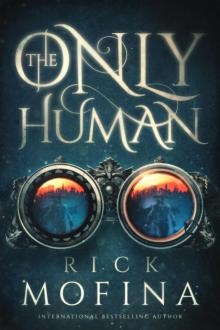 The Only Human
The Only Human Tom Reed Thriller Series
Tom Reed Thriller Series![[Tom Reed and Walt Sydowski 04.0] No Way Back Read online](http://i1.bookreadfree.com/05/tom_reed_and_walt_sydowski_04_0_no_way_back_preview.jpg) [Tom Reed and Walt Sydowski 04.0] No Way Back
[Tom Reed and Walt Sydowski 04.0] No Way Back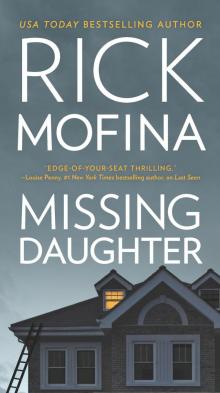 Missing Daughter
Missing Daughter Their Last Secret
Their Last Secret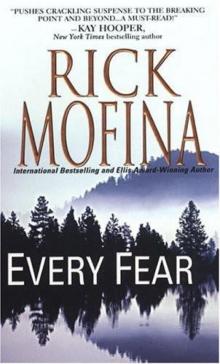 Jason Wade - 02 - Every Fear
Jason Wade - 02 - Every Fear In Desperation
In Desperation Every Second
Every Second Full Tilt
Full Tilt Search for Her
Search for Her The Last Pursuit
The Last Pursuit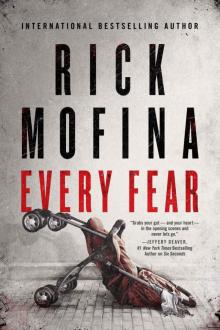 Every Fear
Every Fear Last Seen
Last Seen The Panic Zone
The Panic Zone The Panic Zone jg-2
The Panic Zone jg-2 Free Fall
Free Fall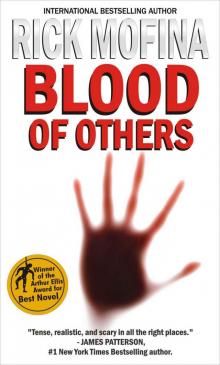 Blood of Others
Blood of Others![[Jason Wade 02.0] Every Fear Read online](http://i1.bookreadfree.com/i1/03/31/jason_wade_02_0_every_fear_preview.jpg) [Jason Wade 02.0] Every Fear
[Jason Wade 02.0] Every Fear Backup
Backup Perfect Grave
Perfect Grave Into the Dark
Into the Dark Whirlwind
Whirlwind Perfect Grave jw-3
Perfect Grave jw-3 If Angels Fall (tom reed and walt sydowski)
If Angels Fall (tom reed and walt sydowski) Six Seconds
Six Seconds If Angels Fall
If Angels Fall They Disappeared
They Disappeared Vengeance Road
Vengeance Road Before Sunrise
Before Sunrise A Lifetime Burning in a Moment
A Lifetime Burning in a Moment Blood Red Rings (Dangerous Women & Desperate Men)
Blood Red Rings (Dangerous Women & Desperate Men) As Long As We Both Shall Live (Dangerous Women & Desperate Men)
As Long As We Both Shall Live (Dangerous Women & Desperate Men)![[Tom Reed and Walt Sydowski 01.0] If Angels Fall Read online](http://i1.bookreadfree.com/i2/04/12/tom_reed_and_walt_sydowski_01_0_if_angels_fall_preview.jpg) [Tom Reed and Walt Sydowski 01.0] If Angels Fall
[Tom Reed and Walt Sydowski 01.0] If Angels Fall Cold Fear
Cold Fear Be Mine
Be Mine Three Bullets To Queensland
Three Bullets To Queensland